In the bustling world of culinary delights, the art of crafting the perfect panini is a skill that can set a restaurant apart. But to excel in this craft, one must invest in the right tools—the heart of which is a reliable, high-quality panini press. Today, we delve into the world of restaurant-grade panini presses, the allure of private labeling, and the transformative impact they can have on your business. Join us as we explore the journey from selecting the ideal manufacturer to witnessing the success stories that have made private label panini presses a staple in the foodservice industry.
Introduction to the World of Panini Presses
The world of panini presses is a vibrant and increasingly popular corner of the culinary equipment market. These versatile devices have become a staple in many kitchens, from bustling restaurants to cozy cafes, and even in the homes of passionate grill enthusiasts. But what exactly is a panini press, and why has it captured the hearts of so many chefs and food lovers alike?
At its core, a panini press is a compact appliance designed to cook and press sandwiches, burgers, and other small meals. The technology behind these presses varies, but the fundamental concept is simple: they apply heat and pressure to create a perfectly toasted and melted sandwich with a crispy exterior and a tender interior.
The evolution of the panini press has seen it transition from a simple kitchen gadget to a sophisticated tool that can be a game-changer in the world of foodservice. Today, there are numerous models available, each with its own unique features and capabilities.
One of the key attractions of panini presses is their versatility. They can handle a wide variety of ingredients, from classic ham and cheese to more adventurous combinations like pulled pork and avocado. The ability to cook and press these ingredients ensures that every bite is flavorful and consistently cooked throughout.
Another important aspect of panini presses is the level of control they offer. Many modern models come with adjustable heat settings, allowing users to tailor the cooking process to their specific needs. This is particularly useful when dealing with different types of bread or when cooking a sandwich with a variety of fillings that may require different cooking times.
The design of a panini press is also a critical factor. The most common design features two flat plates that close together, pressing the sandwich firmly against the heat source. Some models have a domed top, which can be ideal for creating a traditional panini with a slightly crispy top and a soft, melty bottom. Others have a flat top that can be used for cooking burgers or other non-sandwich items.
In the commercial kitchen, restaurant-grade panini presses are a must-have. These high-quality appliances are built to withstand the rigors of daily use, with durable materials and robust construction. They are often equipped with features that make them easy to clean and maintain, which is essential in a busy kitchen environment.
For those looking to establish their brand in the market, private labeling is a fantastic opportunity. By partnering with a reputable manufacturer, businesses can create their own branded panini press that reflects their brand identity and quality standards. This not only allows for a unique selling point but also ensures that customers have a consistent experience when they purchase the product.
Private labeling is not just for big-name brands; it’s also accessible for small and medium-sized businesses looking to stand out in a competitive market. By offering a high-quality, restaurant-grade panini press under their own label, these businesses can differentiate themselves and potentially command a premium price.
The benefits of private labeling are numerous. It allows businesses to offer a product that is tailored to their specific needs and market niche. It also provides a sense of exclusivity and trust, as customers often perceive a branded product as being of higher quality. Moreover, private labeling can be a cost-effective way to enter the market, as it often involves lower initial investment compared to creating a new product from scratch.
As the demand for high-quality panini presses continues to grow, so does the need for reliable manufacturers. These manufacturers not only need to produce top-tier appliances but also offer excellent customer service and support. This includes everything from design consultation to after-sales care, ensuring that the private label experience is seamless and rewarding.
In conclusion, the panini press has become a staple in the kitchen due to its versatility, ease of use, and ability to produce mouthwatering results. Whether for personal use or commercial purposes, the world of panini presses offers a wealth of options, and for businesses looking to make their mark, private labeling is a powerful tool to achieve their goals.
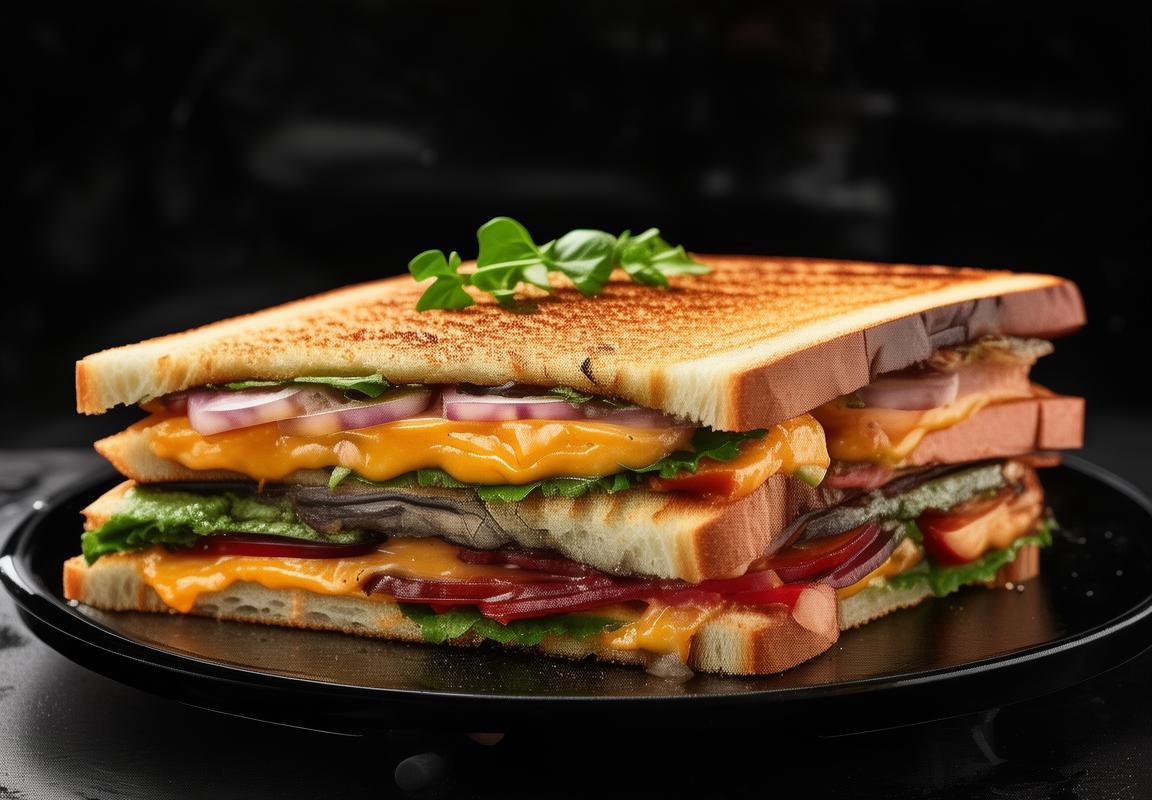
The Importance of Restaurant-Grade Quality
In the bustling world of culinary delights, the panini press has emerged as a staple for creating those perfect, golden-brown sandwiches. But not just any panini press will do; the real magic happens with restaurant-grade quality. The importance of this level of craftsmanship and functionality cannot be overstated, as it directly impacts the quality of the final product, the efficiency of the kitchen, and, ultimately, the satisfaction of the customers.
The durability of restaurant-grade equipment is unparalleled. These presses are built to withstand the rigors of a busy kitchen environment, where they might be used multiple times a day, every day. The materials used are typically of the highest quality, such as heavy-duty stainless steel, which is not only resistant to corrosion but also maintains its shine and appearance over time. This longevity means that restaurant owners can invest in a panini press knowing it will stand the test of time, reducing the need for frequent replacements and the subsequent costs.
Functionality is key when it comes to restaurant-grade quality. These presses are designed with efficiency in mind, featuring features that streamline the cooking process. From even heat distribution to adjustable temperatures, these presses ensure that every sandwich is cooked to perfection, with a consistent texture and color. The ability to control the cooking temperature is especially important, as it allows chefs to cater to a variety of preferences, from crispy to soft, without compromising on quality.
The precision of a restaurant-grade panini press is another crucial factor. The press must be able to apply even pressure across the entire surface of the sandwich, ensuring that the filling is thoroughly heated and the outside is beautifully toasted. This level of precision is what allows for the creation of those signature panini with the perfect blend of textures and flavors. It’s the difference between a satisfactory sandwich and a masterpiece that leaves a lasting impression on the customer.
Hygiene is a paramount concern in the food service industry, and restaurant-grade panini presses are designed with cleanliness in mind. They are easy to clean and maintain, with removable parts that can be washed in a dishwasher or by hand. The non-stick surfaces are not only food-safe but also resistant to wear and tear, reducing the risk of food particles sticking and harboring bacteria. This focus on hygiene not only protects the health of customers but also helps maintain the reputation of the establishment.
The reputation of a restaurant is often tied to the quality of its food. A restaurant-grade panini press is an investment in the brand’s image. When customers see that a restaurant is using top-of-the-line equipment, it signals a commitment to quality and excellence. This perception can be a significant draw for customers looking for a premium dining experience. In a competitive market, the use of such equipment can set a restaurant apart from its competitors.
In the realm of customer satisfaction, the importance of restaurant-grade quality cannot be overlooked. The consistency and quality of the panini produced by these presses contribute to the overall dining experience. When a customer orders a panini, they expect it to be cooked to a high standard, with no compromise on taste or presentation. A restaurant-grade panini press helps deliver on this expectation, leading to repeat business and positive word-of-mouth referrals.
For chefs and kitchen staff, the ease of use is a significant advantage of restaurant-grade equipment. The intuitive design of these presses means that staff can focus on preparing the perfect sandwich rather than dealing with equipment that is complicated or inefficient. This efficiency translates to more time spent on creating culinary masterpieces and less on troubleshooting.
Lastly, the energy efficiency of restaurant-grade panini presses is a practical consideration. These presses are designed to use energy wisely, reducing operational costs and minimizing the environmental impact. In an industry where every dollar counts, the long-term savings on energy bills can be a significant factor in the profitability of a restaurant.
In summary, the importance of restaurant-grade quality in panini presses is multifaceted. It ensures durability, functionality, precision, hygiene, and contributes to the overall customer experience. For any establishment that values its reputation and the satisfaction of its patrons, investing in a restaurant-grade panini press is a no-brainer. It’s an essential tool that not only enhances the quality of the food but also the quality of the dining experience.
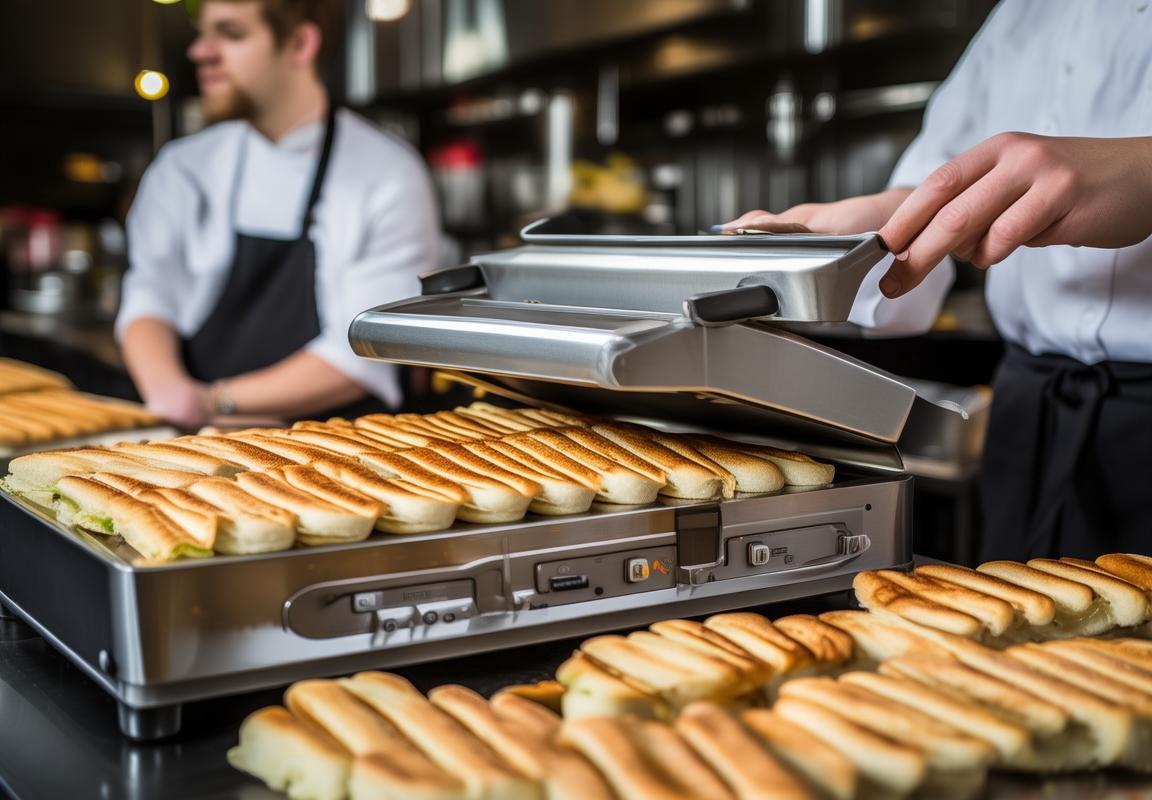
Exploring Private Label Opportunities
Navigating the world of private labeling offers a unique avenue for businesses looking to stand out in a crowded marketplace. By opting for private label opportunities, companies can tailor their products to match their brand identity and customer preferences. Here’s a closer look at what this approach entails and why it’s becoming increasingly popular.
Private labeling allows businesses to offer products under their own brand name, which can be a game-changer for several reasons. For one, it fosters brand loyalty, as customers begin to associate specific qualities and expectations with the brand. This exclusivity can lead to a sense of trust and connection with the consumer.
Moreover, private labeling enables companies to offer unique products that aren’t available through other retailers. This exclusivity can be a significant draw for consumers who are looking for something different or are brand-loyal to certain product lines. By creating a distinct product range, businesses can capture a niche market and build a reputation for innovation.
One of the most appealing aspects of private labeling is the customization it offers. Brands can choose the design, packaging, and even the specifications of the product to align perfectly with their image and marketing strategy. This level of control ensures that the product is not only functional but also visually appealing and consistent with the brand’s message.
When it comes to quality, private labeling gives businesses a chance to set their standards. By working closely with manufacturers, brands can ensure that the products meet their exact requirements. This quality control is crucial, as it allows companies to maintain a consistent level of excellence across all their products, reinforcing their reputation for reliability.
The cost-effectiveness of private labeling is another significant advantage. By purchasing products in bulk from manufacturers, businesses can secure lower prices compared to buying ready-made products from distributors. This cost savings can be passed on to the consumer, potentially making the product more competitive in the market.
Marketing opportunities are abundant with private labeling. Companies can create targeted marketing campaigns that highlight the unique features of their branded products. This direct marketing approach can lead to higher conversion rates, as customers feel a personal connection to the brand and its offerings.
In the retail industry, private labeling is a common strategy used by big-box stores and online marketplaces. However, it’s not limited to these giants. Small businesses and startups can also benefit from this approach by carving out a niche market and establishing a presence in a competitive landscape.
Collaborating with a reputable private label manufacturer is essential. These manufacturers can provide not only the products but also the expertise to help brands navigate the private labeling process. From designing packaging to managing inventory, they offer a comprehensive solution that can streamline operations.
The rise of e-commerce has also played a significant role in the growth of private labeling. With more consumers shopping online, brands have a wider audience to reach. Private labeling allows these brands to offer a variety of products across different channels, from physical stores to online platforms.
Another advantage is the flexibility it offers. Brands can easily expand their product lines without the need for significant investment in new manufacturing capabilities. This agility is particularly valuable in industries where trends can shift rapidly.
Lastly, private labeling can be a strategic move to differentiate from competitors. By offering products that are uniquely their own, brands can establish a clear point of differentiation, making it easier for consumers to remember and choose their products over others.
In conclusion, the opportunities that come with private labeling are vast. From brand differentiation and cost savings to quality control and marketing benefits, it’s an approach that can help businesses thrive in an increasingly competitive market. By leveraging the power of private labeling, companies can not only offer products that resonate with their target audience but also build a brand that stands out in the crowded marketplace.

Top Features of a Restaurant Grade Panini Press
A restaurant-grade panini press is not just a kitchen gadget; it’s a cornerstone of any café, sandwich shop, or gourmet establishment aiming to serve up mouth-watering paninis. Here are some of the top features that set these high-quality presses apart:
-
Even Heat DistributionThe ability to achieve a perfect sear and melt cheese uniformly is crucial. Restaurant-grade panini presses often come with advanced heating elements that ensure even heat distribution across the entire grill surface. This feature guarantees that every sandwich is cooked to perfection, with a beautifully browned crust and a perfectly melted cheese.
-
Sturdy ConstructionA reliable panini press is built to withstand the rigors of a busy kitchen. Look for models made from heavy-duty materials like cast aluminum or stainless steel, which are not only durable but also resistant to warping and corrosion. The weight of a restaurant-grade press can also contribute to better sealing and pressure distribution during the cooking process.
-
Non-Stick CoatingTo make cleanup a breeze and prevent food from sticking, a quality panini press should have a non-stick surface. This feature is essential for maintaining hygiene and ensuring that your sandwiches release easily from the press without leaving behind any residue.
-
Variable Temperature ControlA key feature of professional-grade presses is the ability to adjust the temperature. This allows chefs to tailor the cooking process to different types of bread and fillings, ensuring that each panini is cooked to the desired level of crispiness or softness. Precise temperature control is also important for maintaining consistency across multiple servings.
-
Rapid Heat-Up TimeIn a bustling kitchen, time is of the essence. Restaurant-grade panini presses are designed to heat up quickly, minimizing downtime between cooking each sandwich. This feature is particularly beneficial during peak hours when speed is crucial for maintaining a smooth service flow.
-
Removable Plates for Easy CleaningA hygienic kitchen is a happy kitchen. Many restaurant-grade panini presses come with removable plates that make cleaning a snap. This feature allows you to quickly wipe down the surface after each use, reducing the risk of food contamination and making maintenance a hassle-free process.
-
Locking MechanismFor safety and ease of use, a reliable locking mechanism is a must. This feature ensures that the press stays closed during cooking, preventing accidental burns and ensuring that the sandwich is pressed evenly. A sturdy locking system also makes it easy to open the press after the cooking cycle is complete.
-
Adjustable PressureThe pressure applied by the panini press can affect the texture of the sandwich. Restaurant-grade models often offer adjustable pressure settings, allowing you to achieve a variety of textures from a soft, melt-in-your-mouth sandwich to a crisp, toasted masterpiece.
-
Built-In Safety FeaturesProfessional equipment is designed with safety in mind. Look for features like cool-touch handles and exterior surfaces that prevent burns. Some models even have automatic shut-off mechanisms to ensure the press doesn’t overheat, providing peace of mind for both the chef and the customer.
-
Portability and StorageIn a commercial kitchen space, efficient use of space is crucial. Some restaurant-grade panini presses are designed with compactness in mind, making them easy to store and transport. This is particularly beneficial for caterers or mobile food vendors who need to move their equipment from one location to another.
In summary, a restaurant-grade panini press is an investment in quality and efficiency. The features mentioned above are what make these presses stand out in the commercial kitchen, ensuring that your paninis are consistently delicious and your kitchen operations run smoothly.
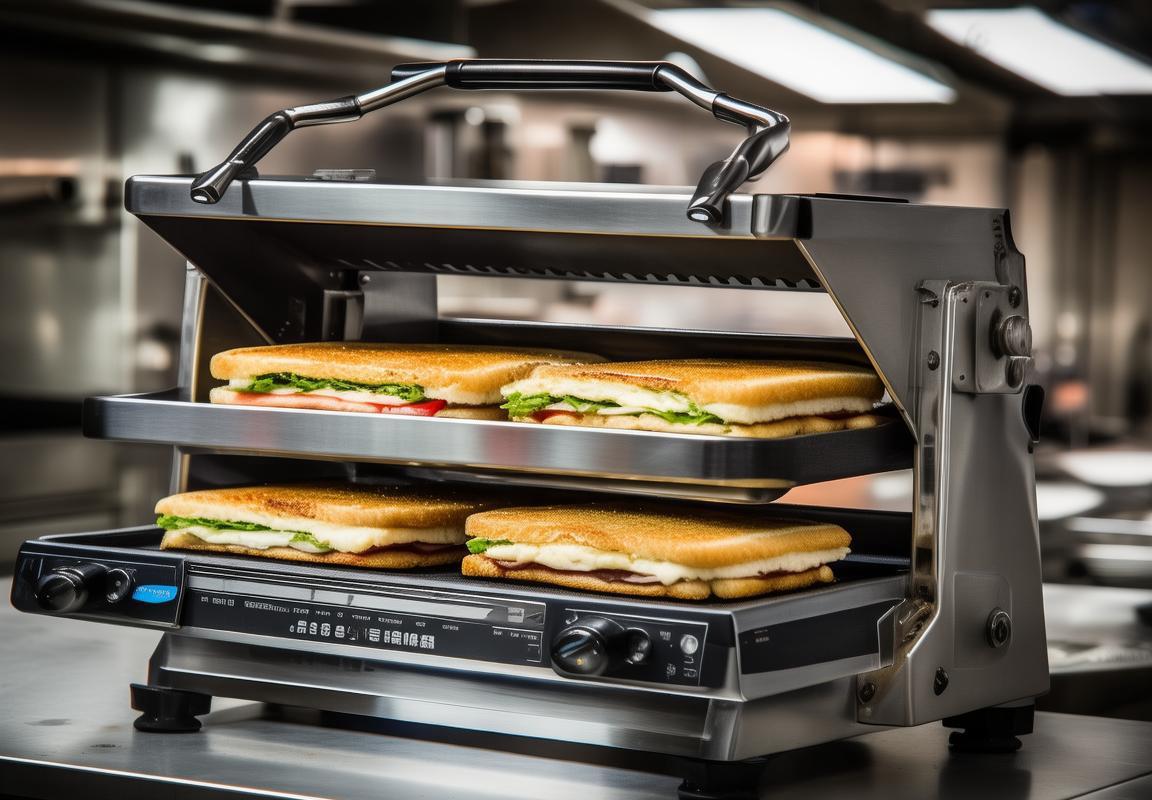
How to Choose the Right Manufacturer for Your Needs
Understanding the specifics of your needs is crucial in selecting the right manufacturer for your restaurant-grade panini press. Here are several key aspects to consider:
-
Reputation and ExperienceSeek out manufacturers with a solid reputation in the industry. Look for those that have been in business for several years, as experience often translates to quality products and reliable service. Check reviews, testimonials, and case studies to gauge their standing among other businesses.
-
Quality of MaterialsThe quality of the materials used in the construction of the panini press is vital. High-grade stainless steel, durable hinges, and heat-resistant components ensure longevity and consistent performance. Inquire about the materials used and ask for certifications that guarantee the quality and safety of the materials.
-
Customization OptionsEvery restaurant has unique requirements. A manufacturer that offers customization options allows you to tailor the panini press to your specific needs. This could include adjustable heat settings, various press plate sizes, or even unique branding for a private label product. Ensure the manufacturer can accommodate your customization requests without compromising quality.
-
Technical SpecificationsConsider the technical specifications that are most important for your operation. Look for features like even heat distribution, adjustable pressure settings, and quick heat-up times. A panini press that can maintain consistent temperatures and pressures throughout its use is essential for producing perfect paninis every time.
-
Maintenance and ServiceA quality panini press is an investment, and regular maintenance is key to its longevity. Choose a manufacturer that offers comprehensive support, including detailed maintenance instructions and replacement parts. Additionally, consider the availability of service technicians in your area, as quick repairs are crucial for minimizing downtime.
-
Warranty and SupportA robust warranty is a sign of a manufacturer’s confidence in their product. Look for a warranty that covers both parts and labor for a reasonable period. Also, inquire about the level of customer support provided. A manufacturer that offers 24⁄7 assistance or a dedicated customer service team can be invaluable when issues arise.
-
Cost and BudgetWhile it’s important to invest in a quality panini press, it’s also crucial to stay within your budget. Compare prices from different manufacturers to find the best value for your money. However, be wary of overly cheap options, as they may not meet the same quality standards as more expensive models.
-
Testimonials and ReferencesAsk for references from current or past clients. Speaking with other restaurant owners or managers who have used the manufacturer’s products can provide insights into the real-world performance and reliability of their panini presses. Personal experiences can be incredibly informative when making a decision.
-
Industry Standards ComplianceEnsure that the manufacturer adheres to industry standards and regulations. This includes safety certifications, such as UL or CE, which guarantee that the panini press meets the necessary safety requirements for commercial use.
-
ScalabilityIf you anticipate growth or changes in your business, consider a manufacturer that can scale with your needs. A manufacturer that offers a range of products and can adapt to your evolving requirements can save you time and money in the long run.
Remember, choosing the right manufacturer for your restaurant-grade panini press is about finding a balance between quality, functionality, and support. Take the time to thoroughly research and evaluate your options to ensure you make the best choice for your establishment.
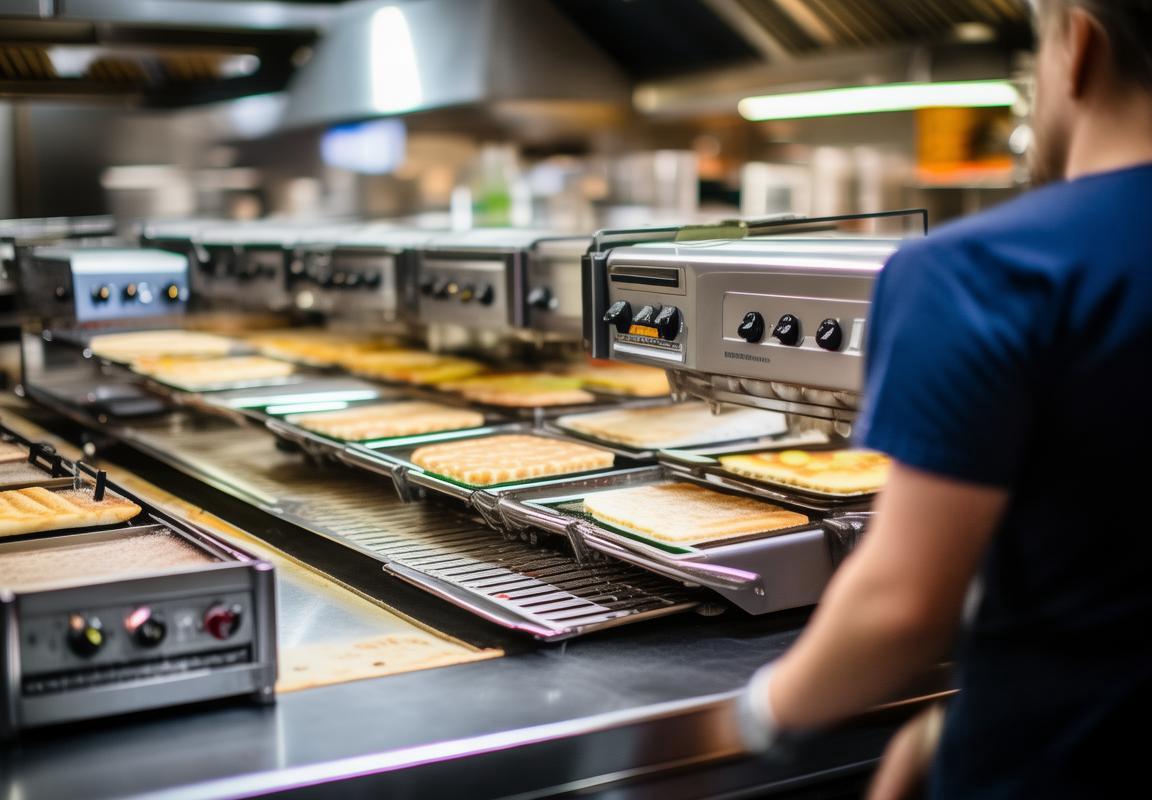
Benefits of Private Labeling Your Panini Press
In the competitive world of foodservice, the decision to private label your Panini press can be a game-changer. Here are some of the key benefits that come with choosing this route:
Enhanced Brand IdentityYour restaurant’s reputation is built on the quality of its offerings. Private labeling your Panini press allows you to create a custom product that reflects your brand’s values and aesthetic. This personalized touch can help differentiate your establishment from competitors, reinforcing your identity in the minds of customers.
Increased Profit MarginsPrivate labeling often means you can set your own prices. By avoiding the markup that comes with purchasing a brand-name Panini press, you can increase your profit margins. This extra revenue can be reinvested into other aspects of your business, such as marketing, menu expansion, or even staff training.
Customization to Fit Your MenuEvery restaurant has its unique menu, and a one-size-fits-all Panini press may not always meet your specific needs. Private labeling allows you to select features that are tailored to your menu, ensuring that your equipment is as versatile as your culinary creations.
Quality ControlWhen you private label, you have a direct relationship with the manufacturer. This means you can ensure that the quality of your Panini presses is consistently high. You can also request specific materials, finishes, and build qualities that align with your standards for excellence.
Building Customer LoyaltyOffering a unique product that customers can only find at your establishment can be a powerful tool in fostering loyalty. A private-labeled Panini press can become a signature item that customers look forward to, making them more likely to return for a taste and, subsequently, a repeat visit.
Flexibility in Product Line ExpansionAs your business grows or as you introduce new menu items, you can easily expand your product line with private labeling. Whether you need additional models or accessories for your Panini presses, having this flexibility can help you adapt to changing market demands and customer preferences.
Reduced Inventory RiskWhen you purchase a private-labeled Panini press, you can often negotiate smaller minimum order quantities. This can help mitigate the risk of overstocking, which can tie up capital and lead to waste. The ability to order in smaller batches allows you to maintain a lean inventory and respond quickly to shifts in demand.
Strengthened Relationships with SuppliersA private labeling arrangement can lead to a stronger, more collaborative relationship with your manufacturer. This can result in better service, such as priority shipping, dedicated customer support, and the opportunity to provide feedback that can lead to product improvements.
Enhanced Marketing OpportunitiesWith a private-labeled Panini press, you have the opportunity to create marketing materials that highlight your brand and the unique features of your product. From packaging to promotional campaigns, you have full control over how you present your Panini press to the public.
Cost-Effective ProductionPrivate labeling can also offer cost advantages in the production process. By working with a manufacturer who specializes in your type of Panini press, you can benefit from their expertise in sourcing materials, manufacturing processes, and efficiency, leading to potential cost savings.
Long-Term Strategic PartnershipsInvesting in private labeling can lay the groundwork for a long-term partnership with a manufacturer. This can provide you with stability and reliability in your supply chain, as well as the potential for exclusive product lines that can be a significant competitive edge.
By considering these benefits, it becomes clear that private labeling your Panini press can be a strategic move that not only enhances your brand but also improves your operational efficiency and financial success.
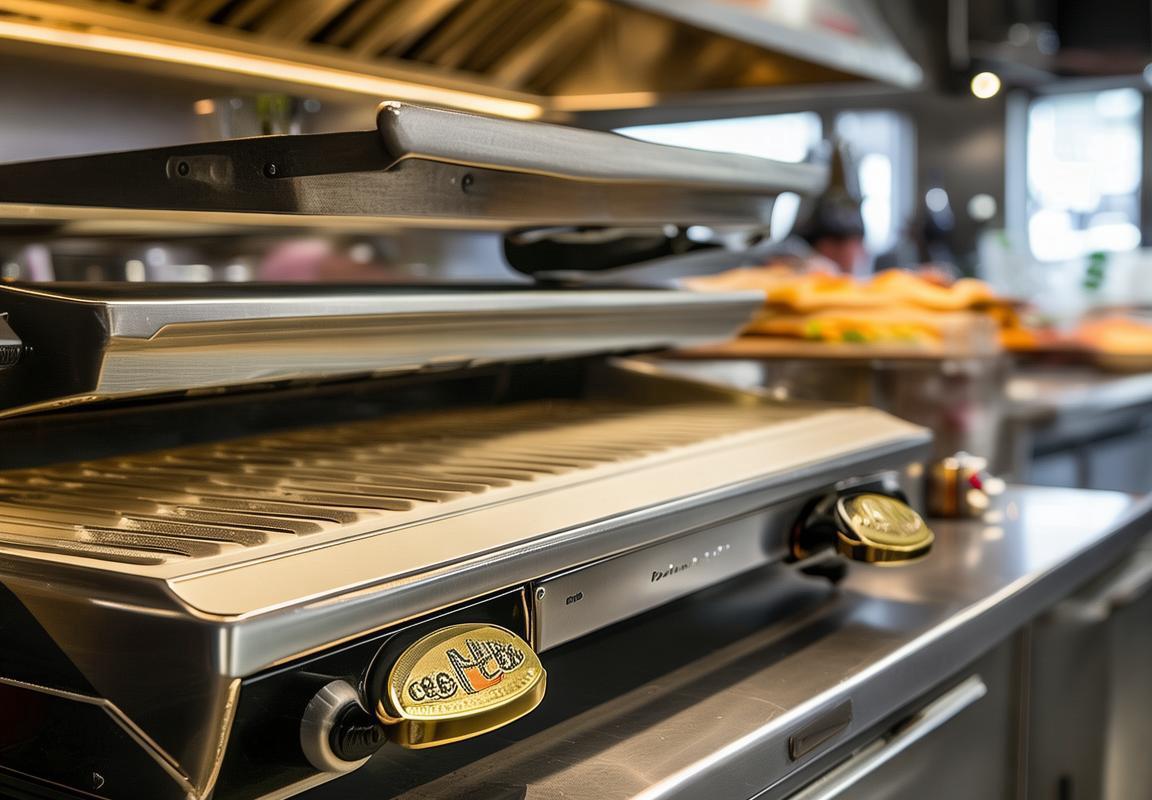
Case Study: Success Stories with Private Label Panini Presses
In the bustling world of culinary innovation, there are tales of entrepreneurs who have turned a simple idea into a thriving business through private labeling. One such story is that of Sarah, a passionate chef turned entrepreneur, who found success with her line of private-label panini presses. Here’s a glimpse into her journey and the impact of private labeling on her business.
Sarah’s passion for cooking and her keen eye for quality led her to the realization that the market was lacking a high-quality, reliable panini press that could withstand the demands of a busy kitchen. She knew that a restaurant-grade panini press was essential for creating those perfect, toasted sandwiches that customers craved. With this vision in mind, she embarked on a quest to find the perfect manufacturer to bring her vision to life.
Sarah’s search for the right manufacturer was meticulous. She scoured the market, attending trade shows, and networking with industry professionals. She wanted a partner who understood her vision, had a reputation for excellence, and could deliver a product that would stand out in the competitive landscape. After much consideration, she found a manufacturer that not only met her criteria but exceeded her expectations.
The manufacturer, known for its precision engineering and commitment to quality, provided Sarah with a custom-designed panini press that was tailored to her specifications. The press featured a sleek, modern design, adjustable heat settings, and a non-stick surface that ensured consistent results every time. The manufacturer also offered a range of customization options, allowing Sarah to add her own logo and branding to the product.
Sarah’s private-label panini press was a hit. The quality and functionality of the product were evident in the delighted faces of her customers, who raved about the delicious sandwiches they were able to create. The success of her private-label venture can be attributed to several key factors:
-
Brand Identity: By private labeling her panini press, Sarah was able to establish a strong brand identity. The product was uniquely hers, and customers could see the care and attention to detail that went into its creation.
-
Quality Assurance: Working with a reputable manufacturer ensured that the panini press met the highest standards of quality. This gave Sarah the confidence to stand behind her product and offer a satisfaction guarantee.
-
Customization: The ability to customize the panini press with her own branding and specifications set her product apart from the competition. It allowed her to create a unique selling proposition that resonated with her target market.
-
Market Differentiation: In a crowded market, private labeling helped Sarah differentiate her product. It gave her the edge she needed to attract customers who were looking for a quality panini press that was uniquely hers.
-
Customer Loyalty: The success of Sarah’s private-label panini press led to increased customer loyalty. Customers not only appreciated the quality of the product but also the personal touch that came with it.
Sarah’s story is just one of many success stories in the world of private labeling. Here are a few more examples:
-
John’s Specialty Grills: John, a seasoned chef, private-labeled a line of high-end grills that were perfect for outdoor cooking. The grills featured innovative designs and superior materials, and John’s customers couldn’t get enough of them.
-
Lila’s Gourmet Baking Tools: Lila, a baker with a knack for creating exquisite pastries, private-labeled a collection of baking tools that were both functional and beautiful. Her brand quickly became a go-to for professional bakers and home cooks alike.
-
Mike’s Coffee Creations: Mike, a coffee enthusiast, private-labeled a line of coffee makers that were designed to deliver the perfect cup of coffee every time. His brand became synonymous with quality and convenience.
These success stories highlight the power of private labeling in the foodservice industry. By partnering with the right manufacturer, entrepreneurs can bring their unique visions to life, create a strong brand identity, and ultimately, achieve business success. Whether it’s a panini press, a gourmet baking tool, or a coffee maker, private labeling offers a world of opportunities for those who are willing to take the leap.
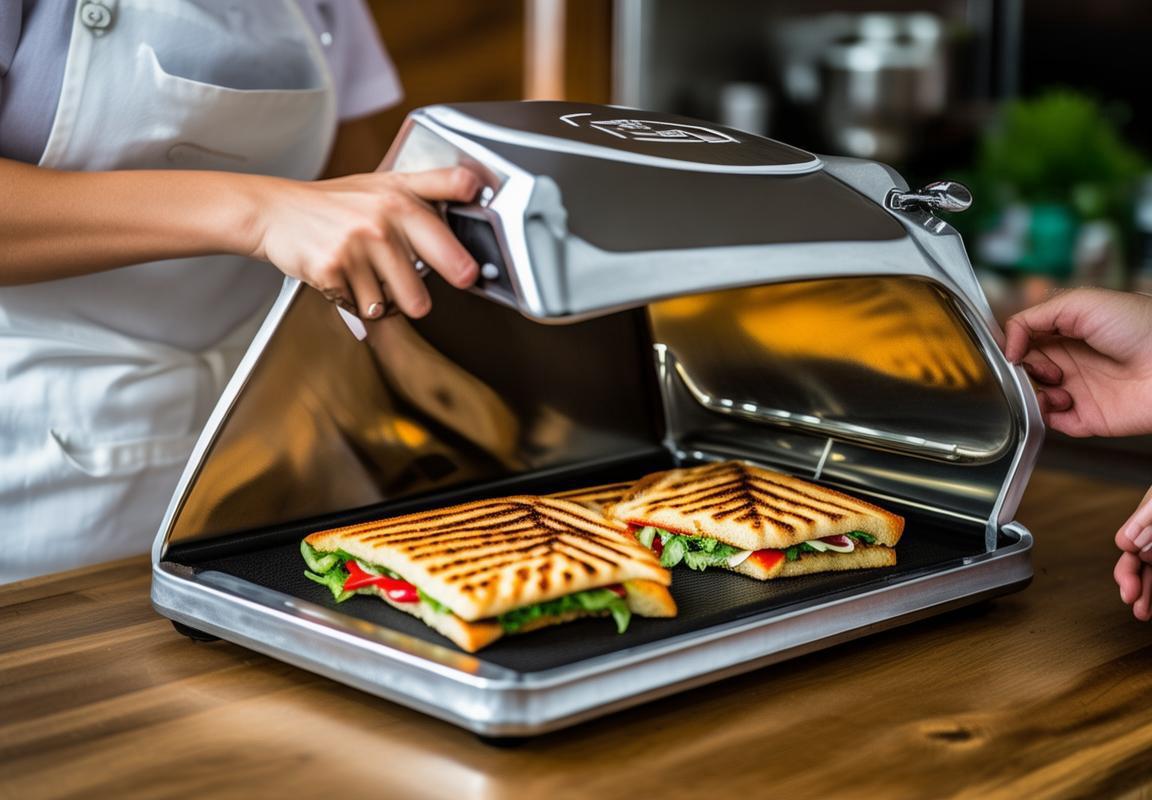
Conclusion: Elevate Your Business with the Perfect Panini Press Solution
In the competitive world of foodservice, finding the right Panini press solution can be a game-changer. A well-chosen Panini press not only enhances the quality of your offerings but also reflects the professionalism and commitment to excellence in your establishment. Here’s how the perfect Panini press solution can elevate your business:
The precision and efficiency of a high-quality Panini press can significantly reduce the time it takes to prepare your signature sandwiches. This means shorter wait times for your customers, happier patrons, and increased table turnover. A faster service means more satisfied customers and a more bustling restaurant.
A restaurant-grade Panini press is designed to withstand the rigors of a busy kitchen. It’s built to last, with durable materials and robust construction. This reliability means fewer breakdowns and less downtime, ensuring that your menu items are consistently prepared to the highest standards.
The aesthetics of your kitchen and dining area can greatly impact the dining experience. A sleek, professional-looking Panini press not only complements your kitchen’s design but also serves as a statement of quality to your customers. It’s an investment in your brand’s image that can make your establishment stand out.
The versatility of a good Panini press is a key factor in its value. It can handle a variety of foods, from classic sandwiches to wraps, pizzas, and even desserts. This flexibility allows you to expand your menu without the need for multiple specialized appliances, saving space and reducing costs.
A quality Panini press often comes with features that make it easier to use. From adjustable heat settings to non-stick surfaces that prevent food from sticking, these features enhance the cooking process and make it more enjoyable for your staff. They also contribute to the longevity of the press by reducing the risk of burns and food residue damage.
The right Panini press can be a valuable tool for marketing your business. By offering a unique and high-quality food item, you can differentiate yourself from competitors. Customers are often willing to pay a premium for exceptional quality and service, making a top-tier Panini press an investment in your bottom line.
In a world where health and wellness are increasingly important, a restaurant-grade Panini press allows you to offer healthier options. You can control the ingredients and cooking methods, ensuring that your sandwiches are not only delicious but also nutritious. This focus on health can attract a broader customer base and enhance your reputation as a responsible establishment.
The customer experience is paramount in the foodservice industry. A well-crafted sandwich, cooked to perfection on a reliable Panini press, can leave a lasting impression. It’s the kind of experience that customers remember and talk about, potentially leading to word-of-mouth referrals and repeat business.
Finally, investing in a high-quality Panini press is an investment in your staff’s skills. A well-designed press can help employees develop their cooking techniques and become more proficient in preparing a variety of items. This not only improves service quality but also contributes to a more skilled and confident workforce.
In conclusion, the perfect Panini press solution can transform your business by improving efficiency, enhancing brand image, increasing menu versatility, and providing an exceptional customer experience. It’s an investment that pays off through satisfied customers, higher profits, and a stronger reputation in the competitive foodservice market.